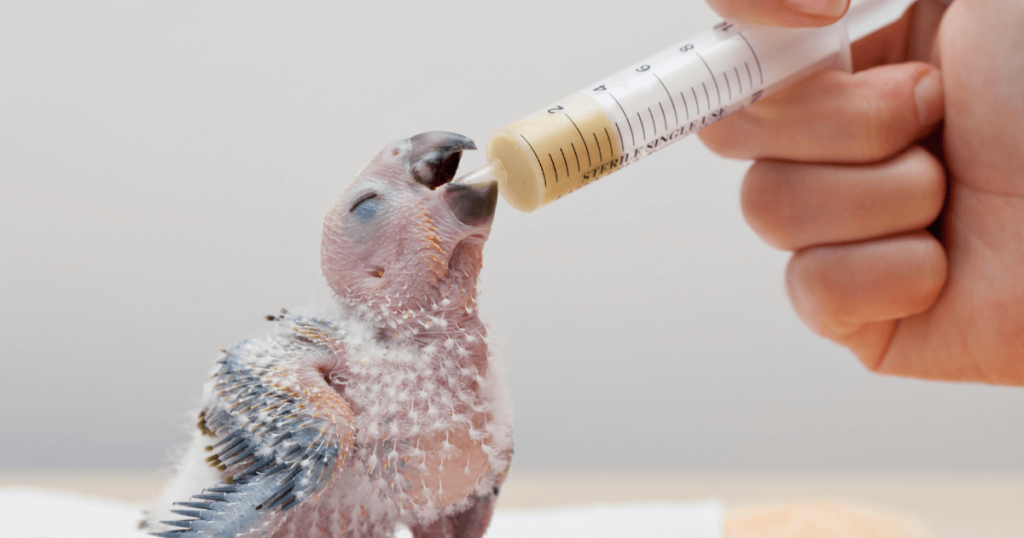Psittacine pediatrics involves the specialized care and nurturing of baby parrot, ensuring their healthy growth and development. One crucial aspect of psittacine pediatrics is providing appropriate housing and nutrition for these delicate avian companions.
In this comprehensive guide, we will explore the best practices and considerations for housing and feeding baby parrots, offering valuable insights to help you raise a happy and healthy feathered friend.
When it comes to housing, creating a safe and stimulating environment is key. Baby parrots require a cage that offers adequate space for them to move around, stretch their wings, and engage in natural behaviors. Selecting the appropriate cage size is crucial, taking into account the specific species and anticipated adult size of your parrot.

Table of Contents
- Outline
- Introduction
- Overview of psittacine pediatric
- Importance of proper housing and feeding for baby parrots
- Housing Baby Parrots
- Choosing an appropriate cage
- Cage placement and environment
- Providing perches and toys
- Feeding Baby Parrots
- Understanding the nutritional needs of baby parrots
- Hand-feeding techniques and equipment
- Introduction to weaning
- Proper Hygiene and Cleaning
- Importance of cleanliness in the bird’s environment
- Cleaning the cage and feeding equipment
- Handling waste disposal
- Monitoring Health and Development
- Regular veterinary check-ups
- Recognizing signs of illness or distress
- Promoting proper growth and development
- Socialization and Enrichment
- Importance of social interaction for baby parrots
- Gentle handling and taming techniques
- Providing mental and physical stimulation
- Common Health Issues in Baby Parrots
- Nutritional deficiencies and imbalances
- Respiratory infections and diseases
- Gastrointestinal problems
- Training and Behavior
- Introduction to basic training commands
- Addressing behavioral issues
- Building a bond with your parrot
- Safety Considerations
- Identifying potential hazards in the environment
- Supervising interactions with other pets
- Preventing accidents and injuries
- Conclusion
- Recap of important points
- Emphasize the significance of providing proper housing and nutrition for baby parrots
- FAQs
- How often should I feed a baby parrot?
- Can baby parrots eat the same food as adult parrots?
- What should I do if my baby parrot refuses to eat?
- Is it necessary to have a vet check my baby parrot?
- How long does it take to wean a baby parrot?
Housing Baby Parrots
Choosing an appropriate cage:
The first step in creating a suitable home for your baby parrot is selecting the right cage. Opt for a spacious enclosure that allows ample room for the bird to move, stretch its wings, and exercise. Ensure the cage bars are appropriately spaced, preventing any chances of the bird getting stuck or escaping. Stainless steel cages are often recommended for their durability and ease of cleaning.
Cage placement and environment:
The location of the cage is crucial for the well-being of your baby parrot. Place the cage in a well-lit area away from direct sunlight and drafts. Avoid placing the cage near the kitchen or areas with potential exposure to toxic fumes. Additionally, providing a stable and comfortable temperature is essential for the bird’s health.
Providing perches and toys:
Parrots are highly active and intelligent creatures, requiring mental stimulation and physical exercise. Include a variety of perches in the cage, ensuring different textures and diameters to promote foot health. Additionally, offer a range of toys that encourage foraging, chewing, and climbing. Regularly rotate the toys to prevent boredom and engage the bird’s curiosity.
Feeding Baby Parrots
Understanding the nutritional needs of baby parrots:
Proper nutrition is vital for the healthy development of baby parrots. Their diet should consist of a balanced mix of commercial hand-feeding formula, fresh fruits, vegetables, and seeds. Consult with an avian veterinarian to determine the appropriate formula and ensure it meets the specific nutritional requirements of your parrot species.
Hand-feeding techniques and equipment:
Hand-feeding is an essential aspect of raising baby parrots, particularly during their initial weeks of life. It requires specialized techniques and appropriate equipment, including syringes, spoons, or feeding tubes. Proper hygiene and correct formula preparation are critical to avoid contamination and ensure the bird receives adequate nutrition.
Introduction to weaning:
As your baby parrot grows, the process of weaning gradually transitions them to a solid food diet. Introduce soft foods, such as mashed fruits and vegetables, alongside the hand-feeding formula. Monitor the bird’s acceptance and adjust the weaning process accordingly, under the guidance of an avian veterinarian.
Proper Hygiene and Cleaning
Importance of cleanliness in the bird’s environment:
Maintaining a clean and hygienic environment is crucial for the health and well-being of baby parrots. Regularly clean the cage, perches, and toys to prevent the buildup of bacteria and fungi. Additionally, ensure that the surrounding area is free from potential hazards and pollutants.
Cleaning the cage and feeding equipment:
Thoroughly clean the cage and feeding equipment with mild bird-safe detergents and disinfectants. Rinse them well to remove any residue before allowing the bird back into its enclosure. Establish a cleaning routine to prevent the accumulation of waste and debris, ensuring a safe and sanitary living space for your parrot.
Handling waste disposal:
Proper waste management is an essential aspect of parrot care. Line the cage with suitable bedding materials, such as newspaper or bird-safe paper, to facilitate easy cleanup. Regularly remove and dispose of soiled bedding and droppings, maintaining a clean and odor-free environment.
Monitoring Health and Development
Regular veterinary check-ups:
Schedule regular visits to an avian veterinarian for comprehensive check-ups and vaccinations. Regular examinations help identify any underlying health issues or developmental concerns early on, enabling prompt intervention and treatment.
Recognizing signs of illness or distress:
Monitor your baby parrot closely for any signs of illness or distress. Look out for changes in appetite, droppings, behavior, or physical appearance. Early detection of potential health problems allows for timely veterinary intervention, ensuring the best chance of recovery.
Promoting proper growth and development:
Provide your baby parrot with an environment that promotes proper growth and development. Offer a balanced diet, opportunities for exercise and mental stimulation, and plenty of social interaction. Ensure a comfortable and stress-free environment to support healthy feather growth and overall well-being.
Aviterium Motion Drop: A Helpful Solution for Preventing Viral, Bacterial, and Fungal Issues in Baby Parrots
When it comes to the health and well-being of baby parrots, prevention is key. Introducing Aviterium Motion Drop, a beneficial solution that aids in preventing viral, bacterial, and fungal issues. This innovative product is designed to support the immune system of baby parrots, providing them with enhanced protection against potential pathogens. By adding Aviterium Motion Drop to your parrot’s care routine, you can take proactive measures to safeguard their health from the earliest stages.
Nutri Boost: Addressing Digestion-Related Issues in Baby Parrots
Ensuring optimal digestion is crucial for the healthy growth and development of baby parrots. That’s where Nutri Boost comes in. This specially formulated supplement is designed to address digestion-related issues in young parrots. With a blend of carefully selected ingredients, Nutri Boost promotes healthy gut flora and aids in the efficient absorption of nutrients. By incorporating Nutri Boost into your baby parrot’s diet, you can provide them with the support they need for optimal digestion.
Homoeopathy: The Best Remedy for Day One Chicks
When it comes to the well-being of day one chicks, homoeopathy offers a natural and effective approach. It is recommended to administer one drop of the homoeopathic medicine in four drops of water, approximately 15 minutes before hand-feeding. This practice can provide vital support to the chicks from their earliest stages of life. By utilizing homoeopathic remedies, you can ensure that your day one chicks receive the care they need for a healthy start.
Socialization and Enrichment
Importance of social interaction for baby parrots:
Baby parrots thrive on social interaction and companionship. Regularly engage with your parrot through gentle handling, talking, and playtime. Gradually expose the bird to different environments, sights, and sounds to encourage adaptability and reduce the likelihood of fear or aggression.
Gentle handling and taming techniques:
Building trust and establishing a bond with your baby parrot requires patience and consistency. Practice gentle handling techniques, such as offering treats, using positive reinforcement, and avoiding sudden movements. Allow the bird to adjust to your presence and gradually increase the duration of handling sessions.
Providing mental and physical stimulation:
Baby parrots are highly intelligent creatures that require mental and physical stimulation to prevent boredom and behavioral issues. Offer a variety of toys, puzzles, and activities that challenge their problem-solving skills. Regular flight or supervised outdoor time can also provide crucial exercise and stimulation.
Common Health Issues in Baby Parrots
Nutritional deficiencies and imbalances:
Improper nutrition can lead to nutritional deficiencies and imbalances in baby parrots, impacting their overall health and development. Consult with an avian veterinarian to ensure your bird’s diet meets its specific nutritional requirements.
Respiratory infections and diseases:
Baby parrots are susceptible to respiratory infections and diseases, especially if their environment is poorly ventilated or contaminated. Maintain a clean and well-ventilated living space, and promptly seek veterinary care if you notice any respiratory symptoms.
Gastrointestinal problems:
Digestive issues, such as diarrhea or crop infections, can occur in baby parrots. Proper hand-feeding techniques, formula preparation, and maintaining hygiene are crucial in preventing gastrointestinal problems. If you observe any digestive abnormalities, seek veterinary assistance immediately.
Training and Behavior
Introduction to basic training commands:
Training your baby parrot is a rewarding experience that strengthens the bond between you and your feathered companion. Begin with simple commands like “step up” or “come here,” using positive reinforcement and rewards. Consistency and patience are key to successful training sessions.
Addressing behavioral issues:
Baby parrots may exhibit behavioral issues, such as biting, screaming, or feather plucking. Understand the underlying causes and address them with positive reinforcement, redirection, and environmental enrichment. In severe cases, consult with an avian behaviorist for expert guidance.
Building a bond with your parrot:
Creating a strong bond with your baby parrot is crucial for its well-being and long-term companionship. Spend quality time together, talk to your parrot, and offer treats or favorite foods as positive reinforcement. Building trust and mutual respect lays the foundation for a healthy and loving relationship.
Safety Considerations
Identifying potential hazards in the environment:
Parrots are curious creatures, and it’s essential to bird-proof your home to prevent accidents and injuries. Remove toxic plants, secure electrical cords, and avoid exposing your parrot to harmful chemicals or substances. Conduct a thorough inspection of your living space to identify and eliminate potential hazards.
Supervising interactions with other pets:
If you have other pets, ensure their interactions with your baby parrot are supervised. Some animals may view birds as prey or exhibit aggressive behavior, posing a risk to your parrot’s safety. Gradually introduce your parrot to other pets under controlled circumstances, always prioritizing their well-being.
Preventing accidents and injuries:
Parrots are known for their curiosity and ability to explore their surroundings. Prevent accidents by ensuring windows and doors are securely closed, and avoid leaving small objects or substances within reach. Regularly inspect the bird’s environment for any potential hazards that may cause harm.
Conclusion
Proper housing and feeding are vital for psittacine pediatrics and raising baby parrots. A suitable cage, cleanliness, and a balanced diet are essential for their healthy growth. Monitoring their health, prioritizing socialization and enrichment, addressing behavioral issues, and ensuring a safe living space are important. With the right care and attention, you can develop a rewarding and fulfilling companionship with your baby parrot.
